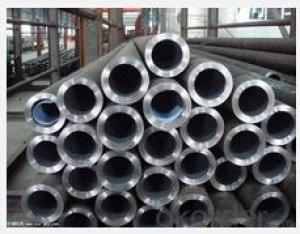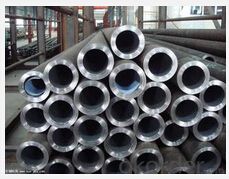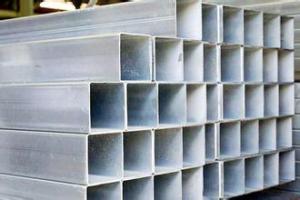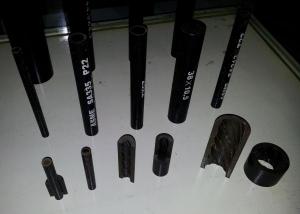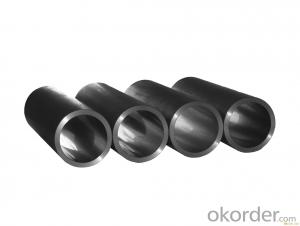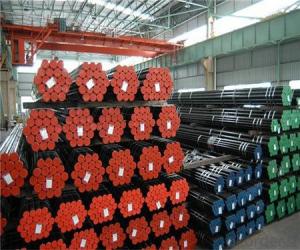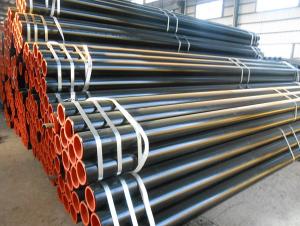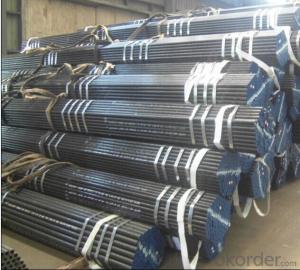Seamless steel tubes for ships
- Loading Port:
- China Main Port
- Payment Terms:
- TT OR LC
- Min Order Qty:
- -
- Supply Capability:
- -
OKorder Service Pledge
OKorder Financial Service
You Might Also Like
Standards:
Standard for malerials and wielding from Chinese classifying society Chinese clasifying society(CCS)
Standard of DNV Det Norske Veritas(DNV)
Standard of Lloyd’S Register of UK(LR) Lloyd’S Register of UK(LR)Standard of Germanischer Lloyd Germanischer Lloyd(GL)
Standard of American Bureau of Shipping(ABS)American Bureau of Shipping(ABS)
Standard of BUREAU VERITAS(BV)BUREAU VERITAS(BV)
Standard of RINA Italian classification society(RINA)
Standard of NIPPON KAIJI KYOKAI(NK)NIPPON KAIJI KYOKAI(NK)
GB/T5312 Chinese national standard
Appication:
Seamless steel tubes for manufacturing marine boilers and ovemeaters as we as pressure pipes opf grade I and Ⅱ.
Model N0.of major steel tubes
320,360,410,460,490,etc.
Types of steel tubes | Outer diameters | wall thickness | ||
Cold-rolled tubes | Rube size(mm) | tolerances(mm) | Tube sizes (mm) | Tolerances(mm) |
>30~50 | ±0.3 | ≤30 | ±10% | |
>50~219 | ±0.8% | |||
Hot-rolled tubes | >219 | ±1.0% | >20 | ±10% |
Mechanocal properties:
Standard code | Models of steel tubes | Tensile strength(MPa) | Yield strength(MPa) | Elongation(%) |
GB/T5312 | 320 | 320~410 | ≥195 | ≥25 |
360 | 360~480 | ≥215 | ≥24 | |
410 | 410~530 | ≥235 | ≥22 | |
460 | 460~580 | ≥265 | ≥21 | |
490 | 490~610 | ≥285 | ≥21 |
Chemical compisition:
Standard code | Models of steel tubes | Chemical compisition(%) | ||||
C | Si | Mn | P | S | ||
GB/T5312 | 320 | ≤0.16 | ≤0.35 | 0.40~0.70 | ≤0.035 | ≤0.035 |
360 | ≤0.17 | ≤0.35 | 0.40~0.80 | ≤0.035 | ≤0.035 | |
410 | ≤0.21 | ≤0.35 | 0.40~1.20 | ≤0.035 | ≤0.035 | |
460 | ≤0.22 | ≤0.35 | 0.80~1.40 | ≤0.035 | ≤0.030 | |
490 | ≤0.23 | ≤0.35 | 0.80~1.50 | ≤0.035 | ≤0.030 | |
Note:residual elements:Cr≤0.25%,Mo≤0.10%,Ni≤0.30%,Cu≤0.30%aggregate≤0.70%
- Q: How are steel pipes used in the fabrication of storage tanks?
- Steel pipes are commonly used in the fabrication of storage tanks due to their strength, durability, and corrosion resistance. They are utilized in various ways, such as forming the structural framework of the tank, creating the walls and roof, and connecting different components together. Additionally, steel pipes can be welded or bolted to ensure a secure and leak-proof construction, making them an ideal choice for storage tank fabrication.
- Q: How much is 4 inches steel tube MM?
- 1 inches =25.4 mm;4 inches =101.6 mm;The specification of steel pipe is usually nominal size;
- Q: What are the different coating materials used for steel pipes?
- There are several different coating materials used for steel pipes, including epoxy, polyurethane, coal tar enamel, and zinc. These coatings are applied to the steel pipes to provide protection against corrosion and to enhance their durability and lifespan.
- Q: Can steel pipes be used for underground pressure pipelines?
- Yes, steel pipes can be used for underground pressure pipelines. Steel pipes are known for their strength and durability, making them suitable for various applications, including underground pressure pipelines. They can withstand high pressure and are resistant to corrosion, making them a reliable choice for transporting fluids or gases underground. Additionally, steel pipes are available in different sizes and thicknesses, allowing for customization based on the specific requirements of the pipeline project. However, it is important to ensure proper coating or lining of the steel pipes to prevent corrosion caused by soil conditions or the transported substance. Regular maintenance and inspections are also necessary to ensure the integrity and longevity of the underground pressure pipelines made of steel pipes.
- Q: Can steel pipes be used for transporting slurry?
- Yes, steel pipes can be used for transporting slurry. Steel pipes are commonly used in various industries, including mining, construction, and oil and gas, for transporting different types of fluids, including slurry. Slurry is a mixture of solid particles suspended in a liquid, usually water, and steel pipes have the required strength and durability to handle the abrasive nature of slurry. Additionally, steel pipes have excellent resistance to corrosion, which is crucial when dealing with slurry that may contain corrosive elements. The smooth inner surface of steel pipes also helps to minimize friction and ensure efficient flow of the slurry. Overall, steel pipes are a reliable and commonly used choice for transporting slurry due to their strength, durability, corrosion resistance, and smooth inner surface.
- Q: What is the outer diameter of the steel tube?
- The diameter of a steel pipe refers to the diameter of the steel pipe. The specifications of the steel tube is normal with diameter (diameter and thickness) said, for example 100MM outer diameter and wall thickness of 5MM tube is marked with 100*5.
- Q: What is the difference between internal lining and external coating of steel pipes?
- The distinction between the internal lining and external coating of steel pipes can be found in their respective functions and locations. Internal lining serves as a safeguard for the inner surface of steel pipes, shielding it from corrosion, abrasion, and other forms of harm. It creates a barrier between the transported fluids or substances and the steel pipe, preventing direct contact and potential deterioration. The materials utilized for internal lining, such as epoxy, polyethylene, or cement mortar, are dependent on specific requirements and the nature of the substances being transported. The internal lining ensures the longevity and integrity of the steel pipe by reducing the risk of internal corrosion and contamination. On the other hand, external coating is applied to the outer surface of steel pipes. Its primary purpose is to provide protection against external factors such as weathering, soil corrosion, and mechanical damage. Acting as a shield, the external coating safeguards the steel pipe from environmental conditions like moisture, UV radiation, chemicals, and physical impact. Common materials used for external coatings include fusion-bonded epoxy, polyethylene, polypropylene, or bitumen. The selection of coating depends on factors such as exposure conditions, temperature, and the type of soil or surroundings the steel pipe will encounter. In summary, internal lining safeguards the inner surface of steel pipes from corrosion and damage caused by transported substances, while external coating acts as a barrier against external elements and physical stresses. Both internal lining and external coating play crucial roles in ensuring the durability and reliability of steel pipes in various applications, such as oil and gas pipelines, water supply systems, or industrial processes.
- Q: Are steel pipes suitable for desalination plants?
- Yes, steel pipes are suitable for desalination plants. Steel pipes offer several advantages that make them a suitable choice for desalination plants. Firstly, steel pipes are highly resistant to corrosion, which is crucial in desalination plants where the presence of saltwater can be highly corrosive. The corrosion resistance of steel pipes ensures the longevity and durability of the infrastructure, reducing maintenance and replacement costs. Secondly, steel pipes have high strength and can withstand high-pressure conditions, which are often required in desalination plants. The ability of steel pipes to handle high-pressure water flow without any deformations or leaks ensures the efficient and reliable operation of the desalination process. Furthermore, steel pipes have excellent heat resistance properties, making them suitable for desalination plants that often involve heat-intensive processes such as distillation or reverse osmosis. Steel pipes can withstand high temperatures without any structural damage, ensuring the safe and efficient transfer of heated water or steam. In addition, steel pipes are readily available and have a wide range of sizes and specifications, allowing for flexibility in design and construction of desalination plants. This availability and versatility make steel pipes a cost-effective choice for desalination projects. Overall, due to their corrosion resistance, high strength, heat resistance, availability, and cost-effectiveness, steel pipes are highly suitable for desalination plants and are widely used in the industry.
- Q: What is the cost of steel pipes compared to other piping materials?
- The cost of steel pipes can vary based on factors like size, grade, and specifications, as well as market conditions and location. Generally, steel pipes are more expensive than materials like PVC or HDPE. However, when compared to materials like copper or stainless steel, steel pipes can often be more cost-effective. Steel pipes are known for their durability, strength, and resistance to high pressures and temperatures, making them suitable for various applications such as oil and gas pipelines, plumbing systems, and structural supports. Their longevity and reliability can offset the initial higher cost, as they require less maintenance and have a longer lifespan than other materials. Moreover, steel pipes are readily available in different sizes and grades, making them versatile and adaptable to different project requirements. This availability and versatility contribute to their cost-effectiveness, as they can be easily sourced and customized to specific needs. It is important to consider that prices for steel pipes can fluctuate due to market conditions and factors like raw material costs, transportation expenses, and labor charges. Therefore, it is advisable to consult with suppliers or industry experts for accurate pricing information based on specific project specifications and market conditions.
- Q: Can steel pipes be used for power plant construction?
- Yes, steel pipes can be used for power plant construction. Steel pipes are commonly employed in power plants for various applications such as the transportation of fluids, steam, and gases, as well as for structural support. They offer high strength, durability, and resistance to extreme temperatures and pressures, making them suitable for the demanding conditions found in power plants.
Send your message to us
Seamless steel tubes for ships
- Loading Port:
- China Main Port
- Payment Terms:
- TT OR LC
- Min Order Qty:
- -
- Supply Capability:
- -
OKorder Service Pledge
OKorder Financial Service
Similar products
Hot products
Hot Searches
Related keywords
